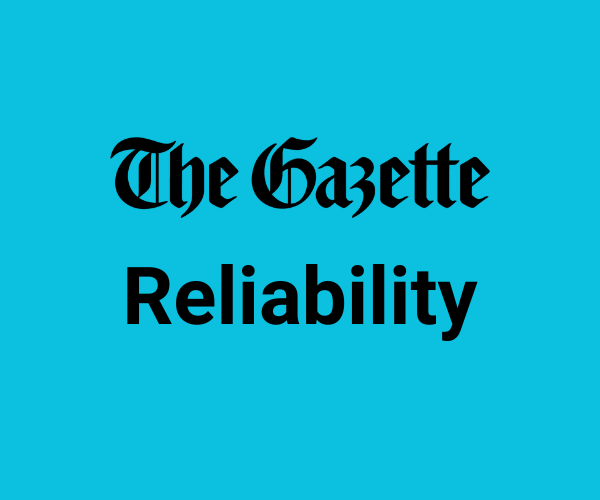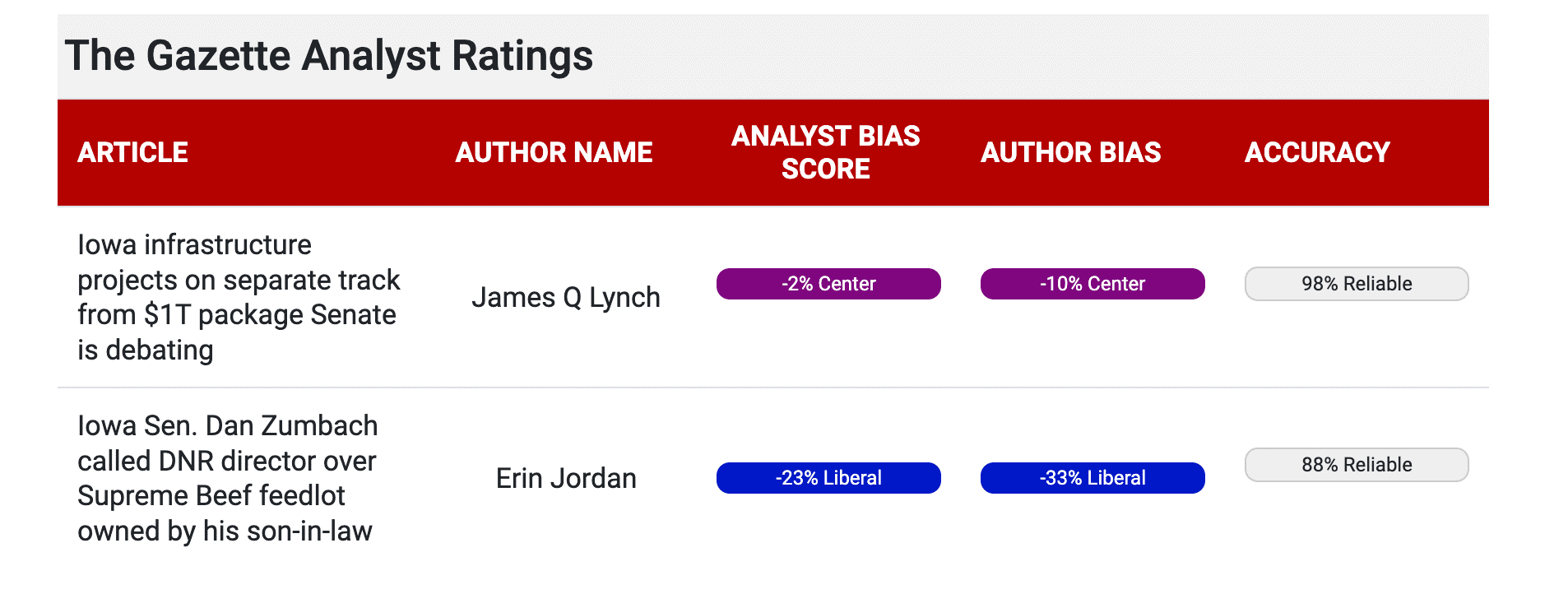
Biasly’s rating for the reliability of the Gazette news is scored ‘excellent’ at a 93% accuracy and is a reflection of the high reliability that the Gazette offers. This generally confirms that, while articles can differ from case to case, the Gazette generally offers reliable news that is supported by factual sources. Biasly’s rating is based on two distinct scores: the Analyst and A.I. ratings. The analysis of different articles and therefore may not apply to most recently published articles.
Does Reliability Matter?
Reliability, in general, refers to how trustworthy or accurate information, or in this case, a news source is. If we consider this definition, it quickly becomes clear why reliability is important in media sources. If we can’t trust the things we read then there isn’t much of a point in continuing to consume content from that source, after all. So how exactly can we gauge the reliability of a news source anyways?
There are several potential measures of reliability to look out for when trying to determine whether a media source is reliable or not. Red flags for an unreliable article can include the presence of wild unsubstantiated claims, facts dependent on other unreliable sources, heavy use of opinionated language, and more. Some indicators of a reliable news source, on the other hand, include things like:
- Absence of subjective/opinionated language in articles
- Credible sources cited (e.g., neutral sources, .gov, .edu websites)
- Facts and statistics backed by multiple relevant outside sources
- Use of primary sources when possible (e.g., interviews, quotes)
- Information that remains consistent across news sources
So How Does Gazette Fare in its Reliability?
The political reliability index developed by Biasly objectively assesses news organizations’ accuracy and trustworthiness. The Gazette’s overall Reliability Score has been rated as ‘Good’ by Biasly. This rating is a weighted average of two distinct scores: the Fact Analysis Score and the Source Analysis Score, each evaluating separate components of The Gazette’s Reliability. When computing the Average Reliability of the article the Fact Analysis score is more heavily weighted. These ratings are as follows in the next two paragraphs:
The Gazette’s Fact Analysis Score is ‘Excellent,’ which suggests readers can trust almost all of The Gazetter’s content online. The Fact Analysis score focuses more on the accuracy of claims, facts, and sources presented in the article and any hints of selection and omission bias, which we will discuss further in the article.
The Gazette’s Source Analysis Score is ‘Fair,’ which suggests readers can trust some of the sources, links, and quotes provided by the news source. This score, which is based on A.I., focuses on assessing the quality of sources and quotes used including their number, lengths, uniqueness, and diversity.
However, since these scores are based on percentages and averages, individual articles could be more or less trustworthy depending on the context, author, and other factors. Our findings show that The Gazette’s reliability is mostly but not all factual because they have retracted several stories in the past or had pieces that were not factual.
Let us analyze the supporting data for The Gazette’s rankings and discuss what to watch out for while searching for trustworthy news sources.
The Gazette’s Accuracy and Reliability
The accuracy and reliability of a news source can be highly impacted by things like bias. If there is evident bias, a news source can lean towards a perspective that may change the actuality of the news that they are reporting. Therefore, reliability doesn’t necessarily mean that there is faulty information in the new source. While this is accurate, it can also mean that the news does not portray the entire story in its natural form. By analyzing different articles in the Gazette, we can better determine the accuracy and reliability of the news that they cover.
Selection bias is when stories and facts are selected or deselected, often on ideological grounds, to create a narrative in support of the new sources’ ideology. Omission bias, on the other hand, is when different opinions and political views regarding a situation are left out so that the reader is only exposed to the ideological perspective supported by the author. It’s important to keep in mind these two types of biases when trying to assess an article’s level of accuracy.

Source: Biasly
The reliability rating on Biasly is very high. However, this may differ from article to article because that rating is based on a set of previous articles that were already analyzed. Therefore, when reading new articles, you can check their reliability through Biasly. An article by the Gazette titled ‘Iowa infrastructure projects on separate track from $1T package Senate is debating’ was rated at 2% Center bias, while the reliability of the article was rated at a high 98%. In comparison to another article, Iowa Sen. Dan Zumbach called DNR director over Supreme Beef feedlot owned by his son-in-law, which had a slightly higher bias rating of 23% liberal and was at 33% reliability. These patterns show that reliability can be affected by bias, in terms of the focus on certain sources or the lack of sources to support the news.
An article by the Gazette titled Iowans cheer as bill removing gender identity from civil rights law fails includes commentary that seems to favor gender identity. Through the title, you can also tell that the focus of the article will be on the celebration of the failed potential bill. However, the commentary that was noted in the article was from representatives of the legislature. Such commentary from high-valued representatives increases the reliability of the article.
“I’m extremely happy to see that by unanimous vote… rejected what was extremely hateful legislation, which would have taken the clock back 15 years in our state code and would have specifically targeted some of the most marginalized people in our state,”
This commentary was made by Representative Sami Scheetz. Noting the high relevancy of this commentary because of the higher level of authority is an example of how even though an article might have bias, that doesn’t mean the reliability cannot be high. Other commentary from citizens of Iowa shows the same leaning in favor of not passing the bill.
Analysis of Reliability in Gazette Opinion Pieces
Opinion articles can have a high level of bias because of the emphasis on the author’s opinion on the given topic. However, opinion articles can be a way to expand someone’s political beliefs by exploring a different perspective than the one that they are used to. The Gazette has had some commentary from readers about the bias present in one of their articles addressing how the Republican candidates refused to meet with their editorial board.
Considering the mostly conservative approach of the Gazette’s opinion articles, a comment from one of their readers from the article, Readers cheer Republican snub of The Gazette, scream ‘bias!, stated that “The Gazette has become an unabashed propaganda arm of the Democratic Party and the modern liberal”. While opinion articles can take a slight leniency on either side of the political spectrum, it seems as though many Republican-standing readers are not satisfied with this generally Democratic focus of the Gazette articles.
Quality of Sources and Facts Used
Sources referenced in an article can be of high value based on the individual who is commenting. The article by The Gazette titled ‘Maine bars Trump from ballot as US Supreme Court weighs states’ authority to block former president’ included many sources of high importance. Some sources were regular civilians who identified whether they were Republican, Democratic, or independent. There were a total of nine quotes and two sources in this article.
The sources from this article include:
- 34 page decision by Secretary of State, Shenna Bellows
- Campaign spokesman, Steven Cheung
- Law professor at the University of California Los Angeles, Rick Hasen
- (Republican), Kimberly Rosen
- (Independent), Thomas Seviello
- (Democrat), Ethan Strimling
- Maine’s house Republican leader, Billy Bob Faulkingham
One of the two sources from this article was a 34 page decision reached by Secretary of State, Shenna Bellows. Another source was a written response by law professor, Rick Hasen, to the decision reached. There were six quotes in favor and three quotes against the decision reached by Bellows.
At first it might seem that the author is showing favoritism to Bellows decision. However, three of those quotes were referenced from the 34 page decision reached by Bellows. Which is important to include to allow the readers to understand why Bellows reached such a decision.
Excluding the quotes from Bellows, the other quotes are from individuals that provide an opinion on the decision. Therefore, when we consider the role that the quotes by Bellows play in the article we can see that the author is mainly trying to provide more context to the decision reached rather then purposely having an even amount of quotes from both sides that may spark uncertainty.
An important aspect to note from this article is the variance in commentary on different political standings. The author made sure to include three individuals with different political standings to give a broader understanding of individuals opinions on the events.
“Secretary Bellows showed great courage in her ruling, and we look forward to helping her defend her judicious and correct decision in court. no elected official is above the law or our constitution, and today’s ruling reaffirms this most important of American principles.”
According to the author, this statement was supported by all three individuals of different political standings. However, the author made sure to address how other Republicans differ from the commentary stated above.
“This is a sham decision that mimics third world dictatorship.”
This commentary is a great example of having a wide range of opinions on the same matter to provide greater context to the readers. This essentially allows the reader to form an opinion of their own without being persuaded by mostly Republican-based or mostly Conservative-based references.
Selection and Omission Bias
To further expand on this idea of diversity in sources, we can consider the article ‘Cedar Rapids Man convicted of lesser charge in 2016 Fort Dodge fatal shooting’. In this article, the author only uses one main source to describe the events that occurred. That source is simply court documents that were filed in the year 2017.
Through those court documents, the author was able to describe the events. However, there was no commentary from any officials to confirm or give a better understanding of the conviction on behalf of the judge. This doesn’t necessarily mean that the article itself is unreliable. But it does create room for uncertainty because of the lack of context from the differing individuals involved. Especially because readers have to rely on those specifically chosen statements from the court documents that the author decided to include. Which can paint a different picture compared to having the full story.
It is important to note here that the court documents are a pretty neutral source of reference. However, that is on its own. The author can choose certain statements and certain events to write about that may create a different perspective.
So Is Gazette Reliable?
In conclusion, it can be said that the Gazette is a highly reliable news source. Besides mainly their opinion articles, they do provide differing perspectives that allow readers to receive the facts of the story rather than be persuaded. While this can differ from article to article, they do a good job at including important sources and also ensuring the accuracy of those sources. To help find the accuracy of specific news articles that you may be interested in, you can use Biasly’s News Bias Checker to uncover reliability ratings and assist you in finding the most accurate and dependable news.






















